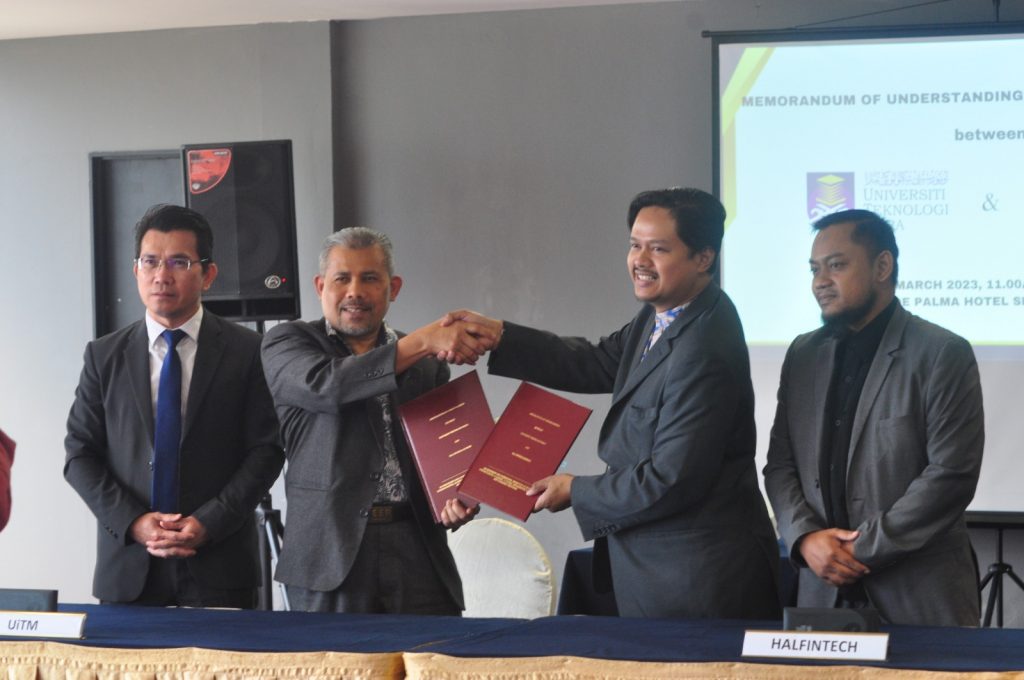By Melati Mohd Ariff
KUALA LUMPUR, April 15 (Bernama) — For many among the Malaysian
entrepreneurs, there is always an aspiration to see their products
being offered for sale on the shelves at hypermarkets nationwide.
For Zaleha Mohamad, an entrepreneur of Roselle products, this dream
came true via the ‘Buy Malaysia’ campaign organised by the Ministry of
Domestic Trade and Consumer Affairs Ministry held at the Mydin
Wholesale Hypermarket USJ, Subang Jaya near here.
“After three years, I am now able to see my products on the display
shelves in the hypermarket,” Zaleha a former researcher at Universiti
Pertanian Malaysia’s (UPM) food technology division told Bernama at the
Mydin Wholesale Hypermarket USJ, Subang Jaya recently.
GOVERNMENT’S STRATEGY
The Buy Malaysia Campaign launched by the then prime minister Datuk
Seri (now Tun) Abdullah Ahmad Badawi last Jan 16 was not only the
government’s strategy to enhance the domestic market for such products
amidst the current economic slowdown.
The campaign is also to ‘open doors’ and provide opportunities for
local entrepreneurs like Zaleha who might have been marginalised during
the rapid growth of supermarket and hypermarket chains in the country.
This campaign also provides the opportunity for the Malaysian
entrepreneurs to prove their capability in producing quality products
with consistent supply.
The campaign began at the Mydin Mall in USJ, before being held at the
Aeon Jusco AU2 Kuala Lumpur (Feb 17-March 1), Giant (Putra Height,
Kuala Lumpur) on March 2 followed by Tesco in Melaka (March 14-22).
Datuk Mohamed Elias Abu Bakar, the Director for Development Division of
the Domestic Trade and Consumer Affairs Ministry said the campaign
would be continued nationwide until end of this year.
Under the ministry’s plans, the campaign would be held next in
Sandakan, Sabah (April 10-15), Terengganu (April 23-27), Johor (May
6-10), Kudat, Sabah (May 10-14), Ipoh, Perak (May 29-June 2), Tuaran,
Sabah (June 2-7), Kuantan, Pahang (June 10-14), Sibu, Sarawak (June
27-29), Tawau, Sabah (July 1-5), Negeri Sembilan (June 23-27), Miri,
Sarawak (July 30-Aug 1), Bintulu, Sarawak (Aug 28-30)and Kuching,
Sarawak (Oct 29-21).
“This campaign is open to changes. The ministry also plans to hold the
Mega Buy Malaysian Goods Campaign in Kuala Lumpur in June or July.
“It is hoped that this campaign would boost the domestic spending and helps traders during the economic slowdown.
“If this happens, it would reduce our dependency on foreign-made
products,” Mohamed Elias told Bernama in his office at Putrajaya
recently.
OPPORTUNITIES
Various products would be on sale throughout the Buy Malaysia Campaign
including foodstuff, garments, electrical appliances and furniture.
On the selection of entrepreneurs and products, the ministry focuses on
items produced in the state where the campaign is held apart from
giving participation to the business fraternity from other states.
“Our focus is definitely on introducing quality and branded local
products that are unfamiliar to the public. We hope many would be aware
that there are quality Malaysian goods that have garnered a reputation
abroad. An example is the canned drinks produced by syarikat Metro
Perda Sdn Bhd.
“We also hope that this effort would be a boost to the domestic
economy. If there are no domestic purchase, companies might have to
fold up and workers retrenched,” said Mohamed Elias.
For entrepreneurs picked to participate in the campaign, such
opportunity is actually difficult to obtain. It is also cost saving, as
participation is free of charge.
Mohamed Elias said the ministry allocates booths apart from providing logistics needs as well as advertisement and promotions.
“Renting a booth in the supermarkets or hypermarkets could be costly,
as it might run to thousands of Ringgit a month. This campaign only
requires them to come and sell their products,” he said.
Mohamed Elias also invited entrepreneurs who have yet to participate in the campaign to sign up.
They only need to contact the Domestic Trade and Consumer Affairs
Ministry’s Business Development Division in Putrajaya or the respective
state offices.
“If their products meet the stipulated criteria, we would invite them
to participate in the campaign,” he said, adding that the campaign
might be extended after 2009 depending on the global economic situation.
NOTHING NEW
Shoppers who visit the Mydin Mall in Subang Jaya could view for
themselves the various Malaysian-made products that lined the
hypermarket’s shelves.
Special ledges were also set aside for small and medium enterprises (SME) products from the respective states in Malaysia.
This initiative according to the merchandising manager for Mydin Mohamed Holdings Bhd, Norman Rajen Abdullah, is nothing new.
He said Mydin, that started its wholesale and retail business more than
50 years ago, has always given its priority on the locally made goods
including that of the SMEs.
“We have long practised the principle of assisting the Bumiputera
entrepreneurs particularly those who face various bureaucracies with
supermarkets or hypermarkets.
“The government has taken the initiative to hold this campaign amidst
this current economic crisis and has spent a lot of money on it.
Publicity on it is also done through the print media, radio and
television. As retailers we should also show our support towards making
the programme a success,” said Norman.
He said almost 80 per cent of the food items at Mydin are locally made despite some bearing international brands.
“The Buy Malaysia Campaign is more on goods made in Malaysia. There are
international brands but made in this country where this provides jobs
for Malaysians,” said Norman.
TAGS AND SMEs
Mydin went a step ahead by placing ‘Buy Malaysia’ or ‘Malaysian
Product’ tags to enable shoppers to identify the locally made goods.
“Not everybody have the time to read what is being written on the
labels. The tags would help the shoppers to easily identify the
Malaysian products.
“We also have many SME products. For the foodstuff alone, we have some
1,500 (types of products) and around 4,000 for the non-food items,” he
said.
He said many of the SME products are on par in terms of quality
when compared against other products, to some extent are better than
the branded goods.
He said the turnover of SME products (food and non-food) has shown encouraging results.
“Last year we recorded a turnover of RM53.4 million as compared to RM27
million in 2007 and RM16 million in 2006. This year we expect a
turnover between RM65 million and RM70 million,” he said.
HELP THE ENTREPRENEURS
Apart from helping to sell and market the SME products, Mydin also
assists the entrepreneurs, among others, by providing courses on
awareness and halal practices.
For the course on halal practices, Mydin is collaborating with the Halal Industry Development Corporation (HDC).
“The cost to attend such a course is about RM950-RM1,000 but we only
charge RM100 for a two-day course including food and lodging,” said
Norman adding that Mydin provides the premises for training while HDC,
the manpower.
He said Mydin hopes the entrepreneurs who attended the Halal practices
course to benefit from the programme and produce goods that have the
best quality including the halal certificate.
“As a company owned by Bumiputera and Muslims, our operation is based
on Islam and we want Mydin to be the first hypermarket to obtain halal
accreditation from HDC,” he said.
“Holding halal courses for SME operators is part of our efforts towards obtaining that recognition,” he said.
In Norman’s viewpoint, the Buy Malaysia is able to inculcate patriotism among the Malaysians.
“We should emulate the Japanese who always give priority to their goods
and strongly support their companies. This patriotism spirit should be
inculcated at the young age, right from the primary school level,” he
said.
MOVE TO CHANGE
Besides the government-provided opportunities to boost the image of
local products via the Buy Malaysia Campaign, the entrepreneurs
themselves should strive towards improving their capability to control
the domestic market and use it as a springboard into the international
market.
Zakaria Ismail, the owner of Metro Perda Sdn Bhd that produces the
‘Perda’ canned drinks, said the Malay entrepreneurs should themselves
make a paradigm shift if they wish to progress in the field.
“The brand of the Malay products usually could not last long as many
were buried as we do not wish to advance, half-hearted attempts and
easily contented. When can we progress?
“There were instances when the Malay retailers themselves were not
confident with the products made by their own people. It was
heartrending to witness this attitude.
“We were treated with harsh words when we approached our own kind to
sell the products. The Malays do not have the spirit to help their own
kind,” said Zakaria.
Perda’s products are also featured at the Mydin Wholesale Hypermarket USJ, Subang Jaya.
Zakaria said the Domestic Trade and Consumer Affairs Ministry has done
a lot to promote the items made by the Malay entrepreneurs.
“But for how long the Malay entrepreneurs should do their business at
stalls or fields at expositions?” he asked. In Zakaria’s opinion, the
government should not only ‘unearth’ the entrepreneurs but also educate
them to be quality and reliable entrepreneurs.
— BERNAMA



